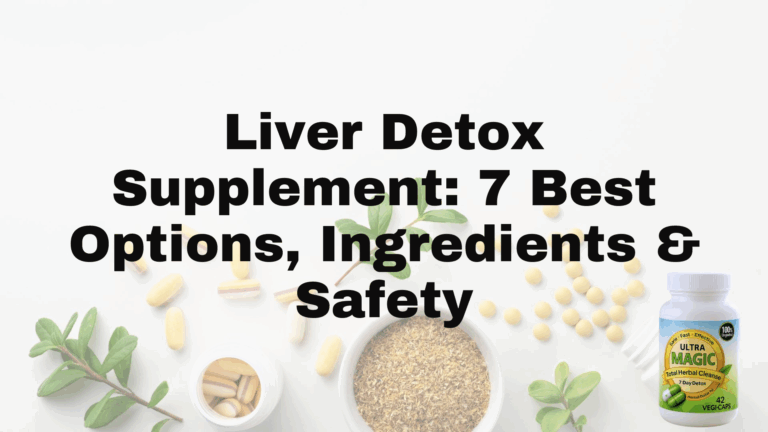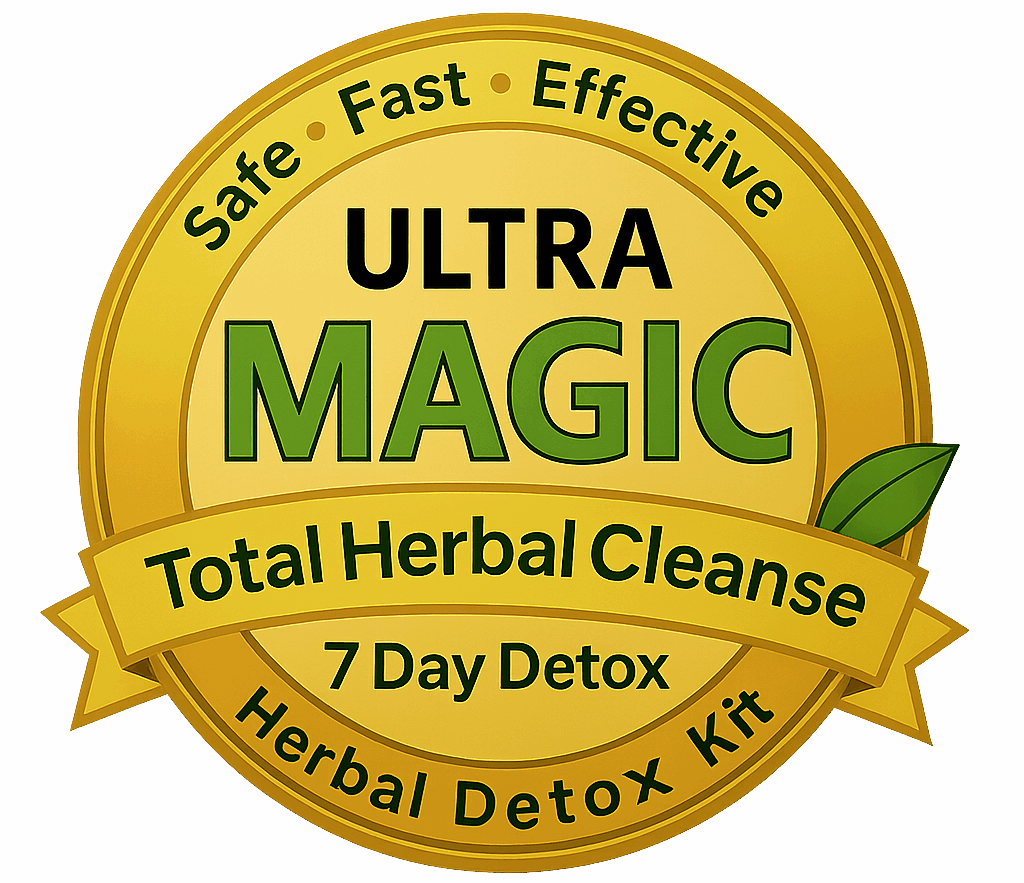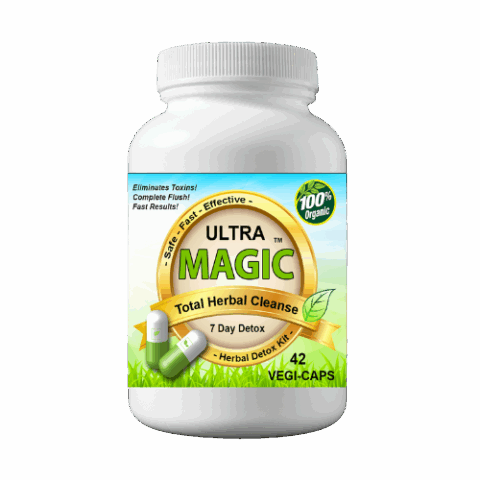
Liver Detox Supplement: 7 Best Options, Ingredients & Safety
Searching for a “liver detox supplement” can feel like wading through hype. One product promises a quick cleanse, another claims to “repair” your liver overnight. Meanwhile, experts warn that some supplements lack solid evidence—and a few can even stress the very organ you’re trying to support. If you’re looking for something effective, safe, and worth your money, you need clear guidance on what actually helps, what’s marketing spin, and how to use these products wisely.
This guide cuts through the noise. We’ll compare seven notable options—from a 7‑day full‑body herbal cleanse to single-ingredient staples like milk thistle, turmeric, artichoke, dandelion, NAC/glutathione, and TUDCA. For each, you’ll see what it is, typical dose ranges, what the research shows (and doesn’t), who it may help, key safety watchouts and interactions, plus price and where to buy. Our goal is simple: realistic expectations, practical dosing, and safety first. Quick note: supplements don’t replace medical care and aren’t FDA-approved to treat disease. Check with your clinician—especially if you take medications, are pregnant, or have known liver conditions. Ready to compare the best options side by side? Let’s start.
1. Magic Detox™ Ultra Magic Detox (7-day full-body herbal cleanse)
If you’re weighing a multi-herb liver detox supplement against single-ingredient options, Ultra Magic Detox is a structured, 7-day protocol built for speed and simplicity. The brand positions it as a “permanent cleanse” targeting urine, blood, saliva, liver, kidneys, and the digestive tract.
What it is
A capsule-based, maximum-strength herbal blend made in the USA in a GMP-certified, FDA-registered facility (St. Augustine, FL). The company has operated since 2008, offers discreet shipping, and a 30-day money-back guarantee.
Key ingredients and typical dose
A concentrated mix of seven herbs in a 7-day schedule (follow label directions; hydrate well).
- Burdock root
- Dandelion root
- Rhubarb root
- Goldenseal
- Sheep sorrel herb
- Cat’s claw bark
- Pau d’arco bark
What the evidence says
Authoritative sources caution that “liver cleanses” aren’t proven to remove damage or detox a healthy liver, and supplements are not FDA-approved for these claims. Johns Hopkins notes mixed, limited human data for popular botanicals (e.g., dandelion, turmeric), and an ACG analysis found no “liver cleanse” formulas recommended by major liver societies. Bottom line: evidence for multi-herb “detox” claims is limited; set realistic expectations.
Who it may help
People who want a short, time-bound, all-in-one protocol and value privacy and a refund policy. The brand states it’s suitable for “heavy users” and individuals up to 320 lbs.
Safety watchouts and interactions
Supplements can stress the liver in some cases; stop and contact a clinician if you develop abdominal pain, dark urine, jaundice, or severe nausea. Avoid if pregnant/breastfeeding, with known liver disease, or when combining with other cleanses. Always review with your clinician—especially if you take medications.
Price and where to buy
Sold directly via magicdetox.com with discreet shipping and a 30-day refund guarantee. Use exactly as directed for the full 7-day protocol.
2. Milk thistle (silymarin) for classic liver support
Milk thistle is the go-to herb most people picture when they think “liver detox supplement.” Its active complex, silymarin, is widely used for liver support and shows the most human research among botanicals in this space—though expectations still need to stay realistic.
What it is
Milk thistle (Silybum marianum) is a flowering plant whose extract (silymarin) is used to support liver health. It’s available as capsules, tablets, and liquids, and commonly featured in liver formulas.
Key ingredients and typical dose
Products vary in extract strength and serving size. Look for standardized extracts that clearly state silymarin content and follow label directions.
- Common market examples list 1,000 mg milk thistle per serving
- Standardized silymarin extracts are typical; consistency over weeks matters
What the evidence says
Clinical research suggests silymarin may improve symptoms in cirrhosis, reduce oxidative stress, and help normalize liver function; some data even suggest fewer liver-related deaths. Early findings also note lipid improvements in people with fatty liver (MASLD). However, Johns Hopkins hepatology cautions there isn’t adequate human trial evidence to recommend routine preventive use, and major liver societies don’t endorse “cleanse” claims. Net-net: promising for specific contexts, not a magic fix.
Who it may help
Adults seeking a single-ingredient, time-tested option for general liver support—especially those working with a clinician for MASLD or chronic liver concerns. Not proven to benefit people with healthy livers.
Safety watchouts and interactions
As with all supplements, rare cases of liver stress can occur. Stop and seek care for abdominal pain, dark urine, jaundice, or severe nausea. Discuss use if pregnant/breastfeeding, if you have liver disease, or take medications. Supplements aren’t FDA-approved to treat disease.
Price and where to buy
Widely available online and in pharmacies; budget options exist (e.g., some 120‑capsule bottles around $10). Choose reputable, third‑party–tested products and follow the labeled dose.
3. Turmeric/curcumin for antioxidant and inflammatory balance
Turmeric shows up in many liver detox supplement formulas because its star compound, curcumin, helps tame oxidative stress and inflammation—two pressures the liver faces daily. It’s a supportive tool, not a cure-all or “cleanse,” and it works best when expectations are realistic and safety is front and center.
What it is
Turmeric (Curcuma longa) is a culinary root; curcumin is its primary bioactive used in supplements. Products position curcumin to support healthy inflammatory balance and liver cell protection, often alongside other herbs in “detox” blends.
Key ingredients and typical dose
Most products feature curcumin extracts or turmeric powder; strengths vary widely by brand, so follow the label and your clinician’s guidance.
- Curcumin extract capsules
- Turmeric root powder capsules
- Multi‑herb liver detox formulas featuring turmeric
What the evidence says
Human research suggests curcumin may support liver regeneration, lower liver enzymes, and help reduce fat in the liver, but studies consistently call for more data to establish overall effectiveness and safety. Johns Hopkins notes turmeric extract has shown protection against liver injury, yet there isn’t adequate clinical trial evidence to recommend routine preventive use or “cleanse” claims.
Who it may help
Adults seeking antioxidant and inflammatory balance as part of a broader plan. Early evidence is most relevant in metabolic liver disease contexts; benefits for people with healthy livers aren’t proven.
Safety watchouts and interactions
Some supplements can cause drug‑induced liver injury. Stop use and seek care for abdominal pain, dark urine, jaundice, or severe nausea. Review with your clinician before use—especially if pregnant or breastfeeding, managing liver disease, or taking medications.
Price and where to buy
Turmeric/curcumin is widely available online and in pharmacies. Choose reputable, well‑tested brands and use exactly as directed on the product label.
4. Artichoke leaf extract to support bile flow and lipids
Artichoke leaf extract shows up in many liver detox supplement formulas because it targets two practical goals: supporting bile flow and helping normalize liver enzymes and blood lipids. It’s a focused, food‑derived option with early human data—best used with realistic expectations and clinical oversight.
What it is
Artichoke (Cynara scolymus) leaf extract is a concentrated botanical commonly sold in capsules or liquids. Brands position it for liver and gallbladder support and to complement diet and lifestyle changes.
Key ingredients and typical dose
Look for clearly labeled artichoke leaf extract with standardized actives; follow the product’s directions consistently over weeks.
- Standardized artichoke leaf extract as a single ingredient
- Combination “liver support” blends pairing artichoke with milk thistle, dandelion, turmeric
- Quality markers: third‑party testing and transparent labeling
What the evidence says
A systematic review of clinical trials found artichoke can decrease liver enzymes (ALT/AST), suggesting liver‑protective activity. In people with metabolic dysfunction–associated steatotic liver disease (MASLD), artichoke leaf extract improved liver enzymes and lipid profiles, and pilot data indicate possible improvements in hepatic venous blood flow. Still, Johns Hopkins hepatology cautions that routine “cleanse” use isn’t supported by robust trials, and an ACG analysis notes liver societies don’t endorse detox formulas.
Who it may help
Adults pursuing clinician‑guided support for enzyme or lipid abnormalities—especially within MASLD—who want a single‑ingredient adjunct to diet and exercise. Benefits in healthy livers aren’t proven.
Safety watchouts and interactions
Some supplements can cause drug‑induced liver injury. Stop and seek care for abdominal pain, dark urine, jaundice, or severe nausea. Discuss use if you’re pregnant/breastfeeding, have liver disease, or take medications. Supplements don’t replace medical treatment.
Price and where to buy
Widely available online and in pharmacies as stand‑alone capsules or in multi‑herb liver detox supplements. Choose reputable, third‑party–tested brands and use exactly as directed.
5. Dandelion root for traditional liver and kidney support
Dandelion root shows up in many liver detox supplement formulas as a classic, gentle botanical. Brands lean on its long traditional use; smart shoppers pair that heritage with realistic expectations and a focus on quality, consistency, and safety.
What it is
Dandelion (Taraxacum officinale) root is an herbal extract or powder offered as capsules, teas, or tinctures, often combined with milk thistle, artichoke, and turmeric in “liver support” blends.
Key ingredients and typical dose
Look for clearly labeled dandelion root (not just leaf) and follow the product’s directions; strengths and serving sizes vary by brand and extract type. Consistent use and good hydration matter more than megadosing.
What the evidence says
Experimental research suggests dandelion can reduce oxidative stress and biomarkers of liver injury (ALT, AST, bilirubin) and lessen fibrosis in animal models. Human trials are still limited, so benefits in people—especially those with healthy livers—aren’t proven. Major liver societies don’t endorse “cleanse” formulas, and experts caution against overpromising detox claims.
Who it may help
Adults who prefer a traditional, food-adjacent herb as part of a broader plan (nutrition, exercise, medical guidance). It’s most sensible as an adjunct within multi‑ingredient support, not a stand‑alone cure.
Safety watchouts and interactions
Any supplement can stress the liver in rare cases. Stop and seek care for abdominal pain, dark urine, jaundice, or severe nausea. Review with your clinician—especially if pregnant or breastfeeding, have liver disease, or take medications.
Price and where to buy
Widely available online and in pharmacies as single‑ingredient root or in multi‑herb liver detox supplements. Choose reputable, third‑party–tested brands and use exactly as directed.
6. NAC and glutathione for detox cofactors and resilience
Think of this category as “support the system that does the detoxing.” Rather than promising to “flush” your liver, these supplements aim to bolster your antioxidant defenses—especially glutathione, a front‑line molecule your liver relies on daily. Many liver detox supplement blends pair glutathione with NAC in the same formula.
What it is
Glutathione is a potent antioxidant made in your body that helps neutralize free radicals and supports liver cell function. NAC is commonly marketed in liver formulas alongside glutathione as a companion ingredient in the same “detox support” stack.
Key ingredients and typical dose
Product strengths vary widely; choose reputable, third‑party–tested brands and follow label directions consistently.
- Standalone glutathione: Capsules or powders labeled as glutathione
- Combo formulas: Liver blends that include glutathione with NAC and other cofactors
What the evidence says
Research shows glutathione plays a key role in liver health, and people with liver disease often have low glutathione. It’s also used clinically for acetaminophen poisoning. Early studies suggest supplementation may promote liver health and support fatty liver metrics, but more human trials are needed to confirm benefits and optimal use. Experts caution that “detox” claims are not FDA‑approved and robust evidence for cleansing a healthy liver is lacking.
Who it may help
Adults working with a clinician on metabolic liver issues who want antioxidant support as part of a broader plan (nutrition, activity, medication management). Benefits for people with healthy livers aren’t proven.
Safety watchouts and interactions
Some supplements can trigger drug‑induced liver injury. Stop use and seek care if you notice abdominal pain, dark urine, jaundice, or severe nausea. Discuss with your clinician before use—especially if pregnant or breastfeeding, have known liver disease, or take medications.
Price and where to buy
Widely available online and in pharmacies as standalone glutathione or in multi‑ingredient liver detox supplements. Prioritize quality (transparent labels, third‑party testing) and use exactly as directed.
7. TUDCA (tauroursodeoxycholic acid) for liver and gallbladder support
TUDCA shows up in “liver detox supplement” searches as a bile‑acid–based option positioned for liver and gallbladder support and “cleanse” protocols. It’s typically sold as standalone capsules and sometimes added to multi‑herb formulas targeting bile flow and digestive comfort. Keep expectations grounded: marketing is ahead of evidence.
What it is
Tauroursodeoxycholic acid (TUDCA) is a bile acid sold as a dietary supplement for liver and gallbladder support. Products often market it for “cleanse/detox,” but those claims aren’t FDA‑approved and aren’t endorsed by major liver societies.
Key ingredients and typical dose
Most products are single‑ingredient TUDCA capsules; strengths vary by brand, so follow the label and your clinician’s guidance.
- Standalone TUDCA: Marketed servings commonly range around 250–500 mg per serving
- Combo formulas: Sometimes paired with herbs in “liver cleanse” blends
- Quality: Prefer third‑party–tested products with transparent labeling
What the evidence says
An American College of Gastroenterology review of top‑selling “liver cleanse” products (including TUDCA bile salts) found limited human data and no endorsement by the American Association for the Study of Liver Diseases or the European Association for the Study of the Liver. Hopkins hepatology likewise cautions that “cleanses” aren’t proven to detox or reverse damage. Bottom line: human evidence for TUDCA as a detox/cleanse is limited.
Who it may help
Adults seeking a targeted, clinician‑guided bile‑acid approach as part of a broader plan (nutrition, exercise, medical care). Not proven to benefit people with healthy livers.
Safety watchouts and interactions
Any supplement can contribute to drug‑induced liver injury. Stop and seek care for abdominal pain, dark urine, jaundice, or severe nausea. Review with your clinician—especially if pregnant/breastfeeding, have liver disease, or take medications.
Price and where to buy
Widely available online as standalone capsules and in multi‑ingredient liver formulas. Choose reputable, third‑party–tested brands and use exactly as directed.
Key takeaways
You’re not buying a magic wand—you’re choosing tools. The best-supported options help the liver do its job (antioxidant balance, bile flow, metabolic health) rather than “flush toxins.” Human evidence is mixed, strongest in metabolic liver contexts, and major societies don’t endorse “cleanse” claims. If you try a supplement, pair it with smart lifestyle moves and medical guidance.
- Set expectations: Supplements aren’t proven to “detox” or reverse existing damage.
- Prioritize safety: Talk to your clinician—especially with liver disease, pregnancy, or medications.
- Buy quality: Choose third‑party–tested products with transparent labels and sensible doses.
- Go slow: Start with one change at a time and follow the product’s directions.
- Know red flags: Stop and seek care for abdominal pain, dark urine, jaundice, or severe nausea.
- Prefer structure and privacy? If a short, all‑in‑one protocol fits your needs, consider the 7‑day Ultra Magic Detox with discreet shipping and a refund guarantee at Magic Detox. Use exactly as directed and keep your clinician in the loop.



